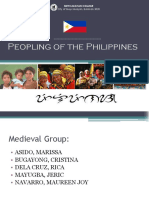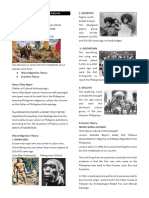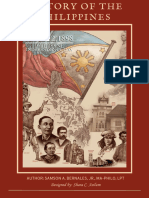0 ratings0% found this document useful (0 votes)
1 views1 The Peopling in The Philippines
1 The Peopling in The Philippines
Uploaded by
caro.loriemaevCopyright:
© All Rights Reserved
Available Formats
Download as PDF, TXT or read online from Scribd
1 The Peopling in The Philippines
1 The Peopling in The Philippines
Uploaded by
caro.loriemaev0 ratings0% found this document useful (0 votes)
1 views2 pagesOriginal Title
1-THE-PEOPLING-IN-THE-PHILIPPINES
Copyright
© © All Rights Reserved
Available Formats
PDF, TXT or read online from Scribd
Share this document
Did you find this document useful?
Is this content inappropriate?
Copyright:
© All Rights Reserved
Available Formats
Download as PDF, TXT or read online from Scribd
Download as pdf or txt
0 ratings0% found this document useful (0 votes)
1 views2 pages1 The Peopling in The Philippines
1 The Peopling in The Philippines
Uploaded by
caro.loriemaevCopyright:
© All Rights Reserved
Available Formats
Download as PDF, TXT or read online from Scribd
Download as pdf or txt
You are on page 1of 2
THE PEOPLING IN THE PHILIPPINES
Three Main Sources
1. The story of God’s Creation
2. The theories of evolution made by human scientist
3. Legends and Fairytales made up by imaginative people
A. THE STORY OF GOD’S CREATION
- According to the Holy Bible, all men and women originated from the first man (Adam) and
the first woman (Eve).
- (Genesis 2:7) This is how humanity began, “The Lord God formed man of the dust of the
ground, and breathed into his nostrils the breath of life; and man became a living soul.” God
then called man Adam, and later created Eve from Adam’s rib.
B. THE THEORIES OF EVOLUTION MADE BY HUMAN SCIENTIST
- It is a belief that man came from apelike creatures who lived thousands of years ago in
caves and have very crude tools.
- They believed that early Filipinos came from “Waves of Migration”; Negritos, Indonesians,
and Malays – who peopled these islands and thousand years ago.
People Before the Spaniards
The Philippines had been inhabited by natives long before the Spaniards arrives. The
Negritos were among the Island’s Indigenous People. The Negritos were known for their
short stature and dark skin. They had curly hair, a small nose, and thick lips. These natives
were barely dressed because their clothing consists of the bahag and a jacket-like upper for
men. They walked around barefoot, without shoes or slippers. Their women usually wear
jewelry, whereas their men usually tattoo themselves. The natives of the island lived in a
small hut known as bahay kubo. These small huts were typically made of bamboo with nipa
roofs, both of which are readily available and abundant in the Philippines. Because the
Philippines is mostly coastal, the natives relied on fishing for a living. The natives, on the
other hand, went hunting for food. This is due to the Philippines’ abundance of natural
resources.
BEYER’S WAVE MIGRATION THEORY
The most widely accepted theory in the Philippines’ prehistoric peopling is that of H.
Otley Beyer is the founder of the University of the Philippines Anthropology Department.
Professor Beyer who headed the department for 40 years, became the undisputed expert on
Philippine prehistory, exerting early leadership in the field and influencing the first
generation of Filipino historians and anthropologists, archaeologists, paleontologist,
geologist, and students worldwide. According to Dr. Beyer, the ancestors of the Filipinos
arrived in different “waves of migration, as follows;
1. “Dawn Man”, a cave-man type who lived 250,000 years ago and was similar to Java Man,
Peking Man, and another Asian Homo erectus.
2. The Negritos are an aboriginal pygmy group who arrived via land bridges between 25,000
and 30,000 years ago.
3. The first immigrants to the Philippines by sea were a seafaring Indonesian group who
arrived around 5,000 to 6,000 years ago.
4. The seafaring, more civilized Malays were the true colonizers and dominant cultural group
in pre-Hispanic Philippines, bringing the Iron Age culture with them.
C. LEGEND AND FAIRYTALES
- Folktales are stories with people as main characters that sometimes include feats of
strength. Myths are stories told to explain the world around us, from the origin of the world,
to why there are seasons. For example, The story of Malakas and Maganda.
You might also like
- Theories On The Origin of The PhilippinesDocument9 pagesTheories On The Origin of The Philippinesjericho0293% (15)
- Infashion: Fun! Fame! Fortune! 2 Edition: Elaine StoneDocument16 pagesInfashion: Fun! Fame! Fortune! 2 Edition: Elaine Stonegail_johnson76100% (3)
- Origin of The Filipino PeopleDocument2 pagesOrigin of The Filipino PeopleArjix HandyMan89% (19)
- Peopling of The PhilippinesDocument47 pagesPeopling of The Philippinesjeric mayugba100% (2)
- Migration TheoriesDocument53 pagesMigration TheoriesJester Ambojnon Tukling100% (1)
- Module 3 - History de Guzman, EugzDocument10 pagesModule 3 - History de Guzman, EugzSasota, Rizza J.No ratings yet
- Origin of FilipinosDocument4 pagesOrigin of FilipinosRaz Mahari100% (2)
- Prehistory of The Philippines: Stone-Age-humans Arrive (30000 BC)Document8 pagesPrehistory of The Philippines: Stone-Age-humans Arrive (30000 BC)marfe_joevelynNo ratings yet
- ReferencesDocument8 pagesReferencescrystalornias05No ratings yet
- Unit 1 Lesson 2 - 085544Document8 pagesUnit 1 Lesson 2 - 085544Rhodiane Marie Isidro100% (1)
- Early Beginnings of Culture and SocietyDocument2 pagesEarly Beginnings of Culture and SocietyJarib CaanawanNo ratings yet
- DgshgysghDocument4 pagesDgshgysghYvonne Calvez SapladaNo ratings yet
- History First InhabitantsDocument1 pageHistory First InhabitantsMystical AbyssNo ratings yet
- RPH Part-2Document6 pagesRPH Part-2Andrei GattoNo ratings yet
- Presented By: DEAN RUFFEL R. FLANDEZ As A Requirement of The Course History 211 - Early To 17 Century Philippine HistoryDocument29 pagesPresented By: DEAN RUFFEL R. FLANDEZ As A Requirement of The Course History 211 - Early To 17 Century Philippine HistoryClaire AbapoNo ratings yet
- The First FilipinoDocument2 pagesThe First FilipinoRasalyn Cericos ValoisNo ratings yet
- The Fallacies of The DeepDocument4 pagesThe Fallacies of The DeepDexter CaroNo ratings yet
- Father of History and Geography - HERODOTUS: HapterDocument4 pagesFather of History and Geography - HERODOTUS: HapterRose Ann RayoNo ratings yet
- The Origin of The FilipinoDocument20 pagesThe Origin of The FilipinoGee LeeNo ratings yet
- Module 3 - de Guzman, EugeneDocument11 pagesModule 3 - de Guzman, EugeneSir Eugene De GuzmanNo ratings yet
- Theories On The Origin of Filipino RaceDocument2 pagesTheories On The Origin of Filipino RaceRegienald ValenzonaNo ratings yet
- Name: Elmer R. Macasling Course & Year: Beed - Iii (Irregular)Document2 pagesName: Elmer R. Macasling Course & Year: Beed - Iii (Irregular)Joh Na AlvaradoNo ratings yet
- PSCI 101 Lesson 2Document17 pagesPSCI 101 Lesson 2roy allawiganNo ratings yet
- Migration TheoryDocument3 pagesMigration TheoryZhiezle Lyka Arevalo50% (2)
- Chaper 34 HistDocument15 pagesChaper 34 HistRalph Brandon BulusanNo ratings yet
- Pre Colonial HistoryDocument7 pagesPre Colonial HistoryJoan ClerigoNo ratings yet
- Proto Maharlikan Philippines) HistoryDocument18 pagesProto Maharlikan Philippines) Historyzilandi100% (1)
- History 01 PrehistoryDocument7 pagesHistory 01 PrehistoryMarnold SalatanNo ratings yet
- Prehistoric Philippines: Anthropology of The Filipino PeopleDocument45 pagesPrehistoric Philippines: Anthropology of The Filipino PeopleHannibal F. Carado100% (1)
- Salazar, Roland Cydney Socsci2 - Sun/7Am-9Am Prehistory of The PhilippinesDocument10 pagesSalazar, Roland Cydney Socsci2 - Sun/7Am-9Am Prehistory of The PhilippinesJustin SalazarNo ratings yet
- LESSON 2 Teaching Social Studies in Elementary Grade (History and Government)Document35 pagesLESSON 2 Teaching Social Studies in Elementary Grade (History and Government)Von JoseNo ratings yet
- Theearlyancestorsofthefilipinos 140113234520 Phpapp01Document17 pagesTheearlyancestorsofthefilipinos 140113234520 Phpapp01symba leiNo ratings yet
- Peopling of The Philippines 1Document20 pagesPeopling of The Philippines 1Angel MarieNo ratings yet
- Peopling of PalawanDocument13 pagesPeopling of PalawanCyndy Loraine PalayNo ratings yet
- Chap 6 Pre Spanish PeriodDocument15 pagesChap 6 Pre Spanish PeriodRhomel John PadernillaNo ratings yet
- The Philippine Pre-HistoryDocument54 pagesThe Philippine Pre-HistoryNICOLEVERA CRUZNo ratings yet
- Dawn of The Philippine CivilizationDocument11 pagesDawn of The Philippine CivilizationCarlos Reyes100% (2)
- Pre Colonial Times 21st CenturyDocument32 pagesPre Colonial Times 21st Centuryalyzzaa aaaNo ratings yet
- The Greater Malayan ConfederationDocument6 pagesThe Greater Malayan ConfederationArkitel toNo ratings yet
- RPH BookDocument72 pagesRPH BookSharaNo ratings yet
- HW 1Document1 pageHW 1LATRELL CASTRONo ratings yet
- Philippine PrehistoryDocument11 pagesPhilippine PrehistoryChristian CatajayNo ratings yet
- Module 1 Prehistoric Era of The PhilippinesDocument8 pagesModule 1 Prehistoric Era of The PhilippinesTrisha Erica JavierNo ratings yet
- The First FilipinosDocument24 pagesThe First FilipinosElle GeeNo ratings yet
- Questions & Challenges in Philippine HistoryDocument27 pagesQuestions & Challenges in Philippine HistoryErin Hojilla67% (6)
- L1 Peopling of PhilippinesDocument50 pagesL1 Peopling of Philippinesmaria luisa rada100% (1)
- Report Indigenous Different Theories of The Peopling of The PhilippinesDocument7 pagesReport Indigenous Different Theories of The Peopling of The PhilippinesRonibe B MalinginNo ratings yet
- Origin and Geography of The PhilippinesDocument35 pagesOrigin and Geography of The PhilippinesazeNo ratings yet
- Handouts Philippine HistoryDocument8 pagesHandouts Philippine HistoryshadowisservingNo ratings yet
- History LectureDocument25 pagesHistory LectureQueensen Mera CantonjosNo ratings yet
- Eed 6 Unit 1 Part 3 StudentsDocument11 pagesEed 6 Unit 1 Part 3 StudentsMhaebilyn DizonNo ratings yet
- Philippine Early Inhabitant To Pre-Spanish Era: A Political TransitionDocument5 pagesPhilippine Early Inhabitant To Pre-Spanish Era: A Political TransitionJack LebronNo ratings yet
- Module 1 Prehistoric Era of The PhilippinesDocument22 pagesModule 1 Prehistoric Era of The PhilippinesCaraig Jonh PatrickNo ratings yet
- Cagayan Valley Philippines: Cagayan Man Refers To A Group of Humans That Inhabited TheDocument27 pagesCagayan Valley Philippines: Cagayan Man Refers To A Group of Humans That Inhabited TheCiena Mae100% (1)
- Philippine HistoryDocument232 pagesPhilippine Historysferaro.fngNo ratings yet
- Peopling of The Philippines and Indigenous PeoplesDocument27 pagesPeopling of The Philippines and Indigenous PeoplesPeepowBelisarioNo ratings yet
- Early Filipino Communities To 1570 CEDocument13 pagesEarly Filipino Communities To 1570 CEJohnAnthonyNo ratings yet
- RPH Reviewer - Groups 1 To 4Document32 pagesRPH Reviewer - Groups 1 To 4delacruzlatsNo ratings yet
- Early Civilizations in The PhilippinesDocument39 pagesEarly Civilizations in The PhilippinesEdison Mamon100% (1)
- Readings in The Philippine History With Indigenous People's Studies 1st Year 1st SemesterDocument119 pagesReadings in The Philippine History With Indigenous People's Studies 1st Year 1st SemesterJhon Keneth Namias100% (4)
- A New Human: The Startling Discovery and Strange Story of the "Hobbits" of Flores, IndonesiaFrom EverandA New Human: The Startling Discovery and Strange Story of the "Hobbits" of Flores, IndonesiaRating: 3.5 out of 5 stars3.5/5 (4)
- LESSON 3.2 Grade 12 HUMSSDocument6 pagesLESSON 3.2 Grade 12 HUMSScaro.loriemaevNo ratings yet
- Reflection Paper - WEEK 2Document1 pageReflection Paper - WEEK 2caro.loriemaevNo ratings yet
- Polar and Nonpolar PDFDocument22 pagesPolar and Nonpolar PDFcaro.loriemaevNo ratings yet
- Caro - EPISODES 13Document35 pagesCaro - EPISODES 13caro.loriemaevNo ratings yet
- Grade 7 - WK 1 (MICROSCOPY)Document41 pagesGrade 7 - WK 1 (MICROSCOPY)caro.loriemaevNo ratings yet
- Narrative Report On Critical ContentDocument2 pagesNarrative Report On Critical ContentMharlone Chopap-ingNo ratings yet
- DLL 8-1Document3 pagesDLL 8-1Vy Rañoa Paz100% (1)
- Ruxandra Coman - Examen EnglezaDocument6 pagesRuxandra Coman - Examen EnglezaMihail CurelescuNo ratings yet
- Job Description - Director of Regional Language CenterDocument3 pagesJob Description - Director of Regional Language CenterAristo hernandezNo ratings yet
- Lesson Plan IN Tle (Cookery) 9: ObjectivesDocument2 pagesLesson Plan IN Tle (Cookery) 9: Objectivesnoribeth ancheta100% (1)
- RRL - ICT3 - ICT in Education - A Crtical Literature and Its ImplicationsDocument15 pagesRRL - ICT3 - ICT in Education - A Crtical Literature and Its ImplicationsMAA NHSNo ratings yet
- SRS3314 Final ExamDocument6 pagesSRS3314 Final ExamPouya KeshtganiNo ratings yet
- Step 3 System Design and DevelopmentDocument9 pagesStep 3 System Design and Developmentleonidas12000% (1)
- Notes On RA 7610 Child Abuse LawDocument6 pagesNotes On RA 7610 Child Abuse Lawbraindead_9167% (3)
- Ancient India: Book Recommendation: Indian Feudalism Urban Decay in India - RS SharmaDocument5 pagesAncient India: Book Recommendation: Indian Feudalism Urban Decay in India - RS SharmaShraddha 7No ratings yet
- DLL Week 1 SHSDocument4 pagesDLL Week 1 SHSmark decena100% (1)
- Problem FormulationDocument7 pagesProblem Formulationapi-361050512No ratings yet
- Theories of Industrial RelationsDocument14 pagesTheories of Industrial RelationsShivalisabharwal100% (2)
- Human Behavior IN University of BatangasDocument35 pagesHuman Behavior IN University of BatangasJayar DimaculanganNo ratings yet
- Big Business and The Ghost of ConfuciusDocument2 pagesBig Business and The Ghost of ConfuciusCharmaine Anjanette Clanor Legaspina100% (1)
- Pratt Travel Narrative and Imperialist Vision CH 8Document23 pagesPratt Travel Narrative and Imperialist Vision CH 8Diana BujaNo ratings yet
- Intimate, Casual, Consultat Ive, Conversational, & Frozen ConversationDocument19 pagesIntimate, Casual, Consultat Ive, Conversational, & Frozen ConversationCriscel Sambrano VivaresNo ratings yet
- Topic: Music & Arts Chapter 2: Arts: I. Vocabulary: Phrasal Verbs & IdiomsDocument7 pagesTopic: Music & Arts Chapter 2: Arts: I. Vocabulary: Phrasal Verbs & IdiomsJennieNo ratings yet
- English Test Unit 2 "My World": MarkDocument3 pagesEnglish Test Unit 2 "My World": MarkMika Padilla AlmonacidNo ratings yet
- Business Ethics: January 2012Document6 pagesBusiness Ethics: January 2012Ra JaNo ratings yet
- Henrich, D - The Proof Structure of The Transcendental DeductionDocument21 pagesHenrich, D - The Proof Structure of The Transcendental DeductionWilli PerriNo ratings yet
- D1 PRE BOARD PROF. EDUCATION Flordeluna An Education Student Was Asked by Prof.Document17 pagesD1 PRE BOARD PROF. EDUCATION Flordeluna An Education Student Was Asked by Prof.Catherine SalamanqueNo ratings yet
- "Assignment # 03": Paragraph 1Document3 pages"Assignment # 03": Paragraph 1Anmol KhanNo ratings yet
- Presentation 1Document7 pagesPresentation 1Leirzej Mart HerederoNo ratings yet
- SUCCI Student Handbook - 2007/2008Document140 pagesSUCCI Student Handbook - 2007/2008succipres100% (5)
- Bloom - Can Prejudice Ever Be A Good ThingDocument6 pagesBloom - Can Prejudice Ever Be A Good ThingBob SmithNo ratings yet
- (Glen A. Love) Practical Ecocriticism Literature, (BookFi) PDFDocument224 pages(Glen A. Love) Practical Ecocriticism Literature, (BookFi) PDFYasir Aslam50% (2)
- Building The NationalDocument6 pagesBuilding The Nationalkhalid alshamsi100% (1)
- Gender Analysis Ppt1Document9 pagesGender Analysis Ppt1Helen B. Arias100% (1)






























































































